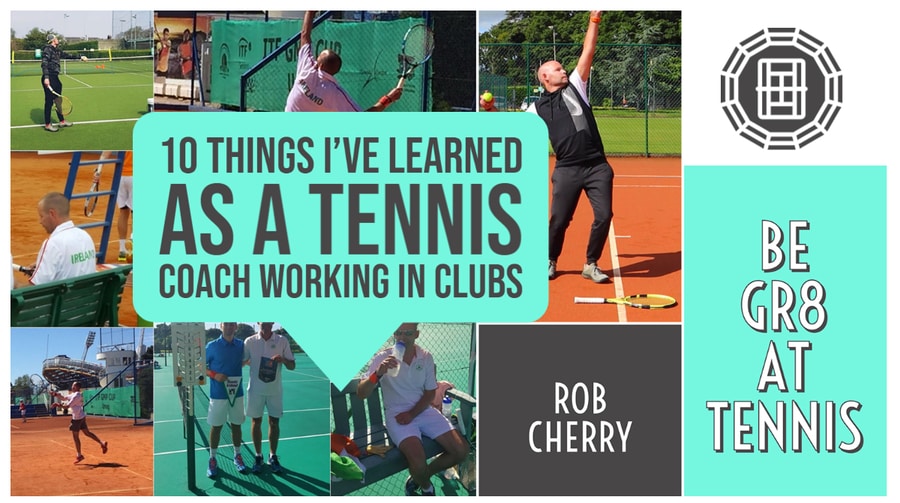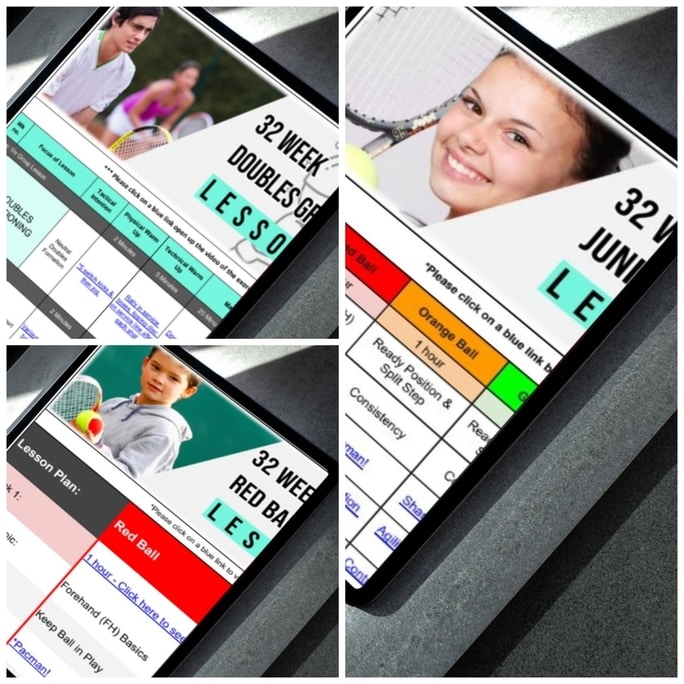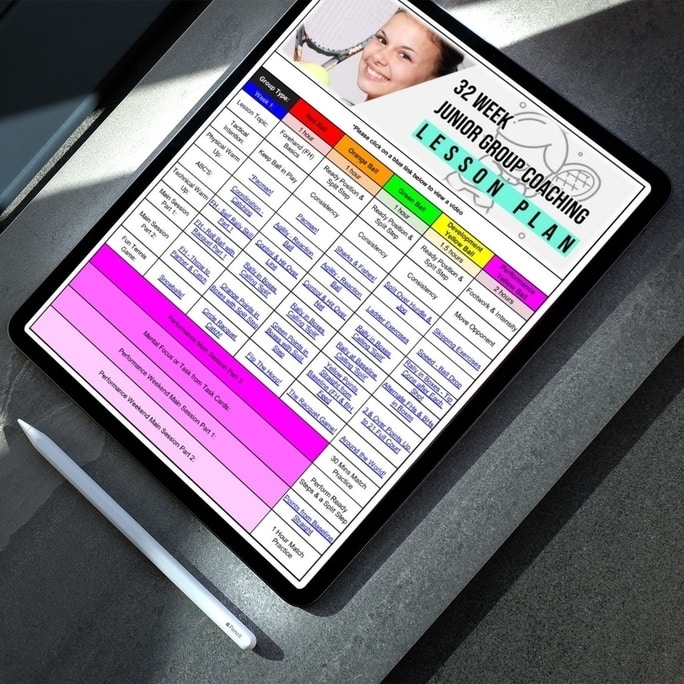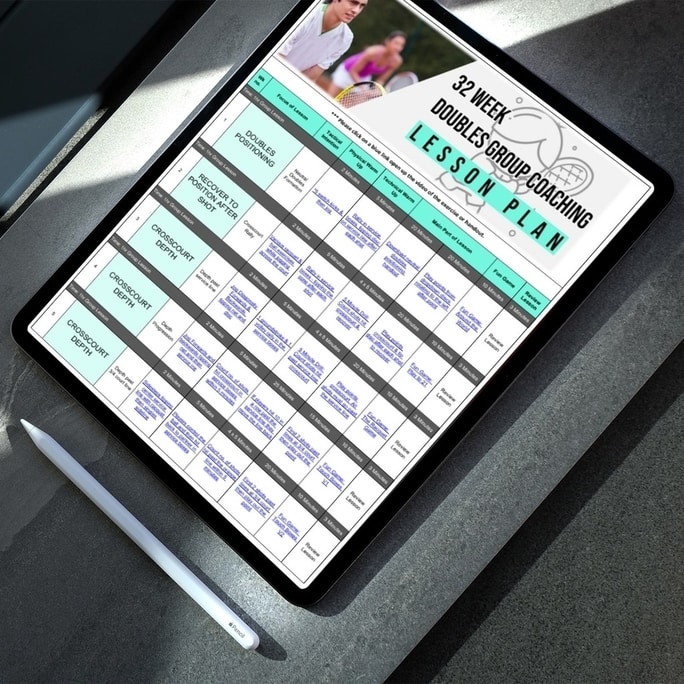10 Things I’ve Learned as a Tennis Coach Working in Clubs

Having worked in clubs as a tennis coach for almost 20 years, 14 years of those as a Head Coach, here are 10 things I’ve learned.
Rob Cherry
1. Treat Players Equally
With regards to junior players, you never know which players will still be playing at your club at 16, 17 or 18 years of age. If you only focus on the best players when they are young, what happens if they leave? If you treat junior players equally and give them all a chance, the club will have lots of really good players when they are older. Junior players often develop at different rates, so the best players u10 and u12, may not be the best players when they are older.
When it comes to adult players, they all deserve a chance to play on league teams if they wish to do so. Many might surprise you, where they may not have great technique, but they are match winners. With little improvements to their game they can also climb up the leagues teams.
2. Care about Helping Players
For sure, earning money is nice, but people appreciate the extra things you do for free. They may not always say thank you but often realize how much you’ve helped them improve. It may be a simple text to ask a parent of a child or an adult player how did they did in their match, or even better try to watch players play when you can. Sending players some tips or a handout is also appreciated.
3. They are NOT your Players
No matter how much you have helped a player, there are so many other people that will help them. Parents, other coaches, their friends, fitness trainers and more. It is a team effort. It can be tough when players decide to get help from another coach, but you can’t take it personally. It can work well, with players often getting extra training hours and another outlook on things.
4. Watching Matches
In my early years as a coach, I found watching matches of junior and adult players quite tough, especially if they were losing! One day I changed my outlook, by imagining I was out there playing and how nerve wracking a match can be for a player. Try understanding what the player is going through during the match and asking them the next day how they felt about the match. There are so many factors that come into play.
5. Working with Parents
It can be at times quite challenging for coaches, working with parents. In most cases, parents just want the best for their child and they care about their child being good at tennis. A lot of it can come down to the parents not understanding how coaching works and it can take a lot of time and effort for a child to become good. Try having parent evenings to explain the process and have them ask questions on anything they may not understand.
If a parent happens to have a go at you one day, give them a chance, you don’t know what type of day they’ve had and they could be like that to everyone. Parents are an essential part in a child’s tennis development. Try your best to have a good coach, parent relationship.
6. It’s not all about Competitive Tennis
The coach may have played at a high level, trained hard every day and expects that from every player they coach. In a club, there are different levels of tennis players, different interests and reasons for playing tennis. All you can do as a coach is try to set up programmes that cater for all ages, abilities and interests. Such programmes are; mini tennis, junior group coaching, adult tennis, social tennis, internal and external leagues, cardio tennis, friendly matches, club nights and more.
Ask players what their goal is for their tennis, what programmes would they like to do. Their goals can change over the years.
7. Working with Committees
One area that can be difficult for coaches, is that committee members can change each year. Committees can have different views on how the club should be run and what programmes should be in place. Committees may be more socially driven, interested in developing the juniors or developing the adults. The coach may have their vision for the club and try to setup programmes, such as a junior academy, fitness training, speakers on nutrition and sports psychology, but all the coach can do is advise. The coach has to adapt to the needs of the club and the members and trust that the committee respect the knowledge and experience of the coach in these areas.
Try to be nice to each member in the club, (if possible!). You never know who the next committee member or president will be!
8. Have a Plan for your Lessons
Do up lesson plans for the various programmes as a guide for the term or for the year. Players can see that there is a structure in place and that the coach isn’t making up what they will do each lesson. Plans are there to be changed, as a number of factors can come into play. Ask players what they would like to work on to improve their game. Also see what format they would like for the lessons, e.g. more technical work, more tactics, footwork, mental, fitness or fun games.
By doing up lesson plans, if a player happens to miss a session, you can send them what they missed, and possibly a description or some videos of the exercises to show them.
9. Work with Experienced Coaches
I really enjoyed doing all of the coaching courses, I learned so much on how to setup lessons, how to teach different players, how to work with committees and parents, mental training and more…
In addition to this, I feel it is important to work under more experienced coaches and see their coaching styles, exercises, structure of lessons and how they handle various situations. I learned valuable information working under experienced coaches and used it to shape the way I wanted to coach.
10. Be open to Suggestions from other Coaches
You may be the head coach, but listen to suggestions from coaches working with you. Another point of view, ways of doing things can be better than you are doing them. What other skills do coaches working with you have that you may not? Ask your fellow coaches, is there anything we could do differently in the programmes. You can learn a lot!
Thank you for reading this article, I hope it helps 🙂 Try your best, that’s all you can do!
Rob Cherry
Be Gr8 at Tennis





